Unit 8 Culture Shapes Us Lesson 45 Different Manners 课件(共42张PPT)
文档属性
| 名称 | Unit 8 Culture Shapes Us Lesson 45 Different Manners 课件(共42张PPT) |  | |
| 格式 | zip | ||
| 文件大小 | 3.6MB | ||
| 资源类型 | 教案 | ||
| 版本资源 | 冀教版 | ||
| 科目 | 英语 | ||
| 更新时间 | 2019-02-22 16:35:02 | ||
图片预览

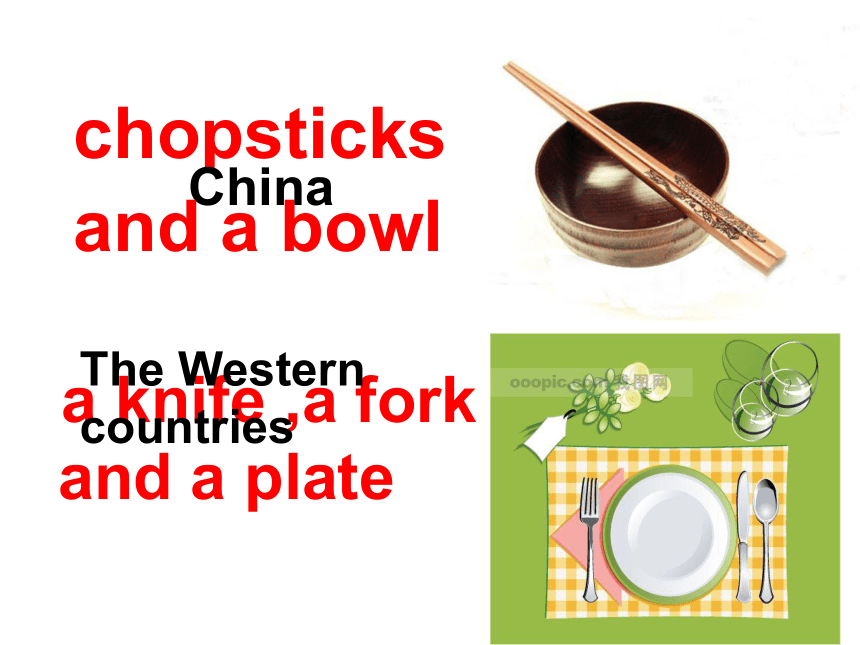
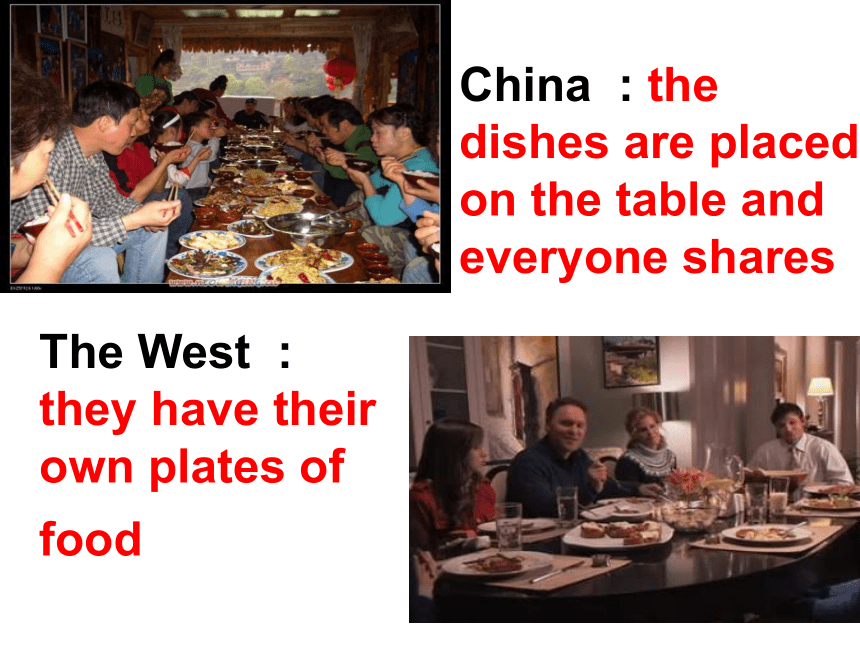
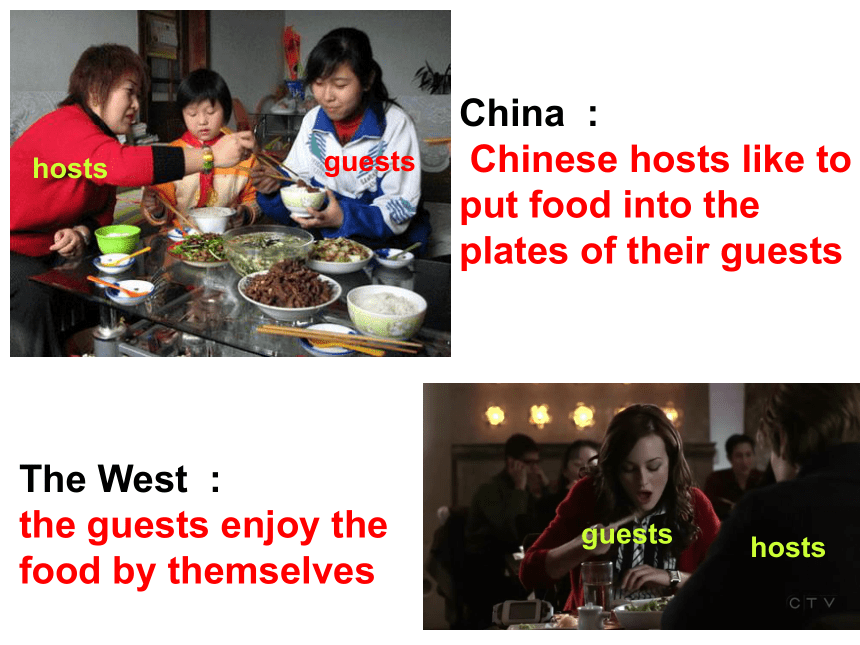
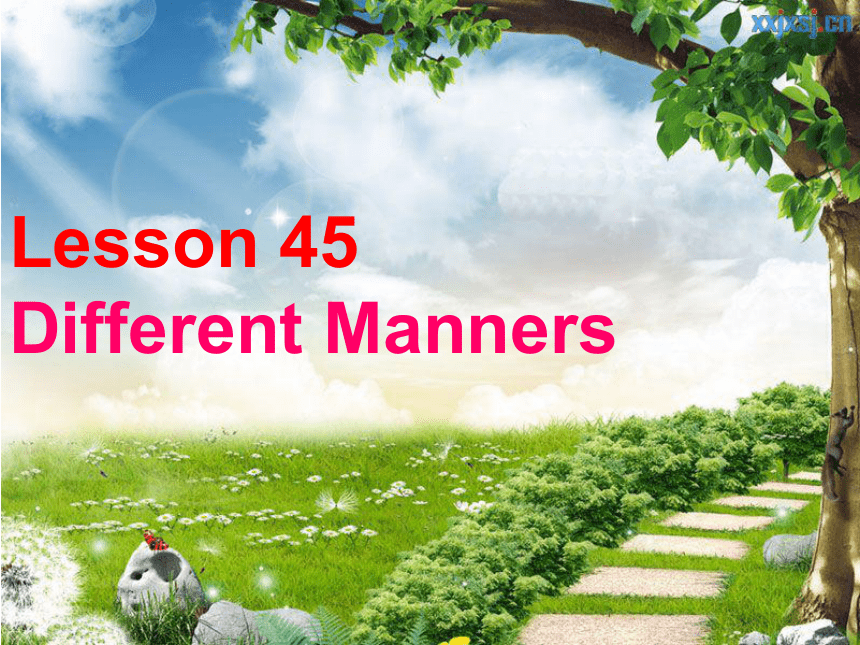
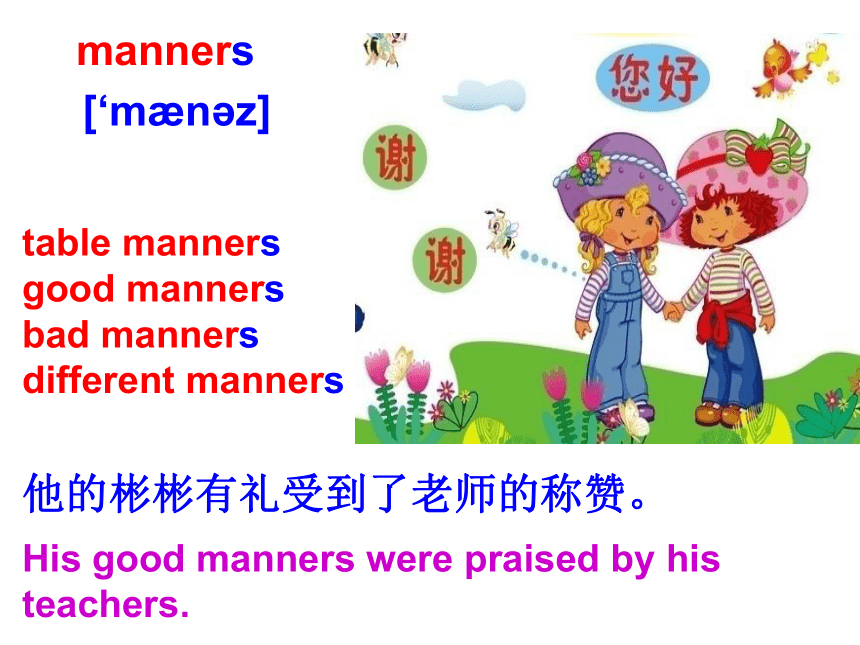
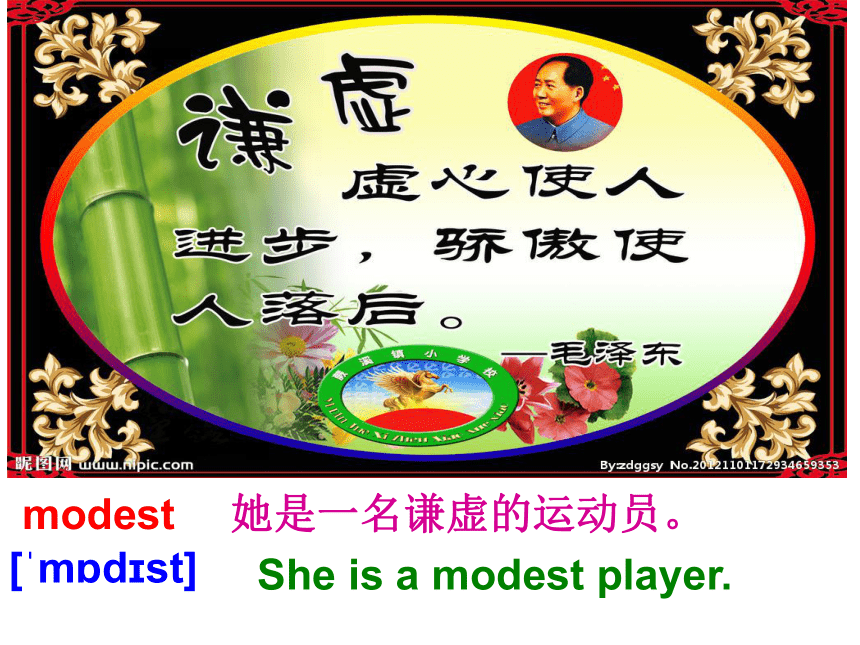
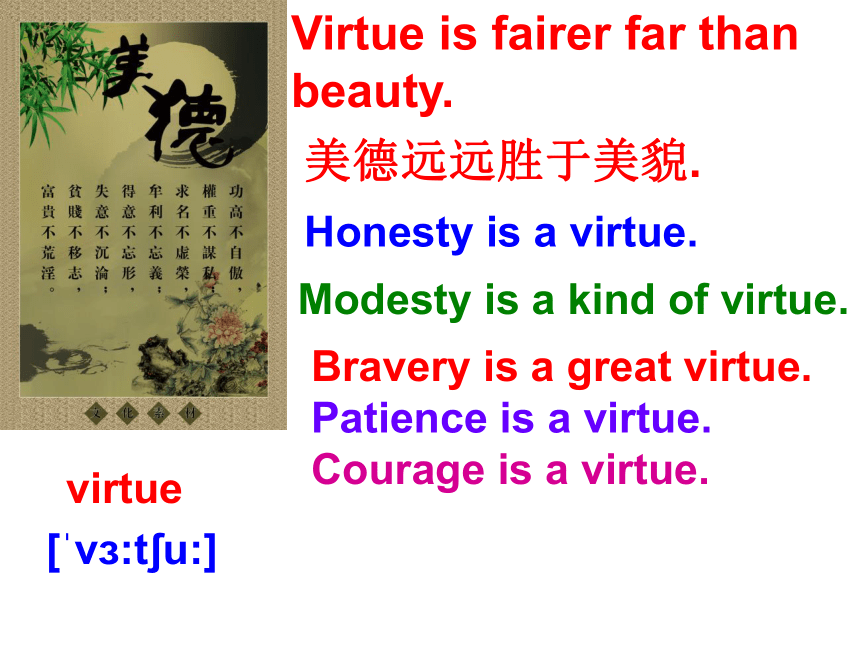
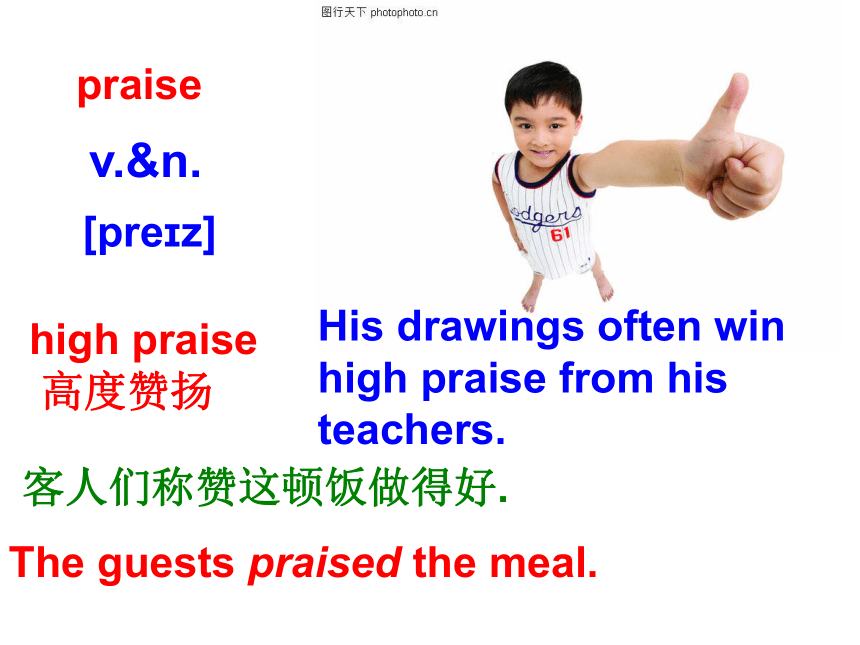
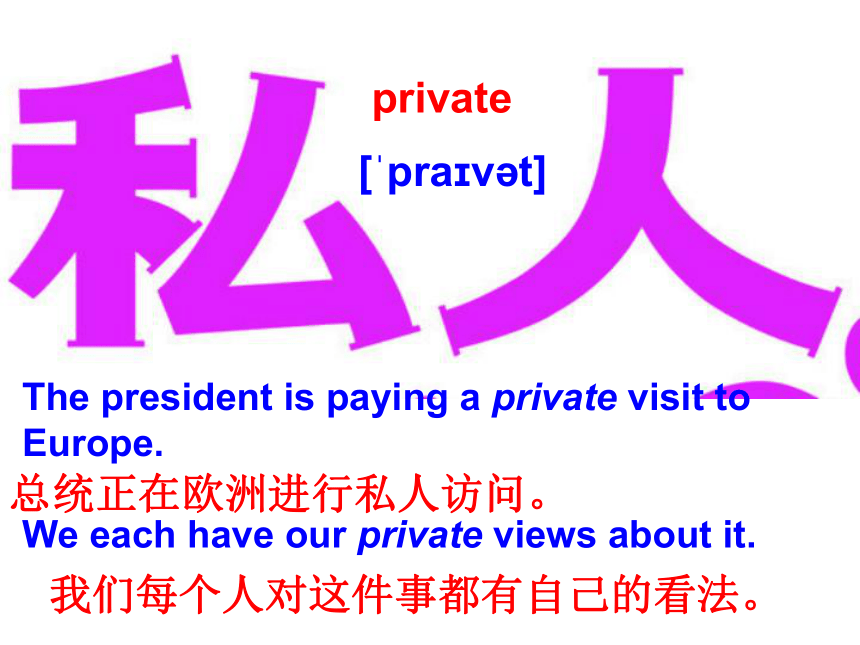
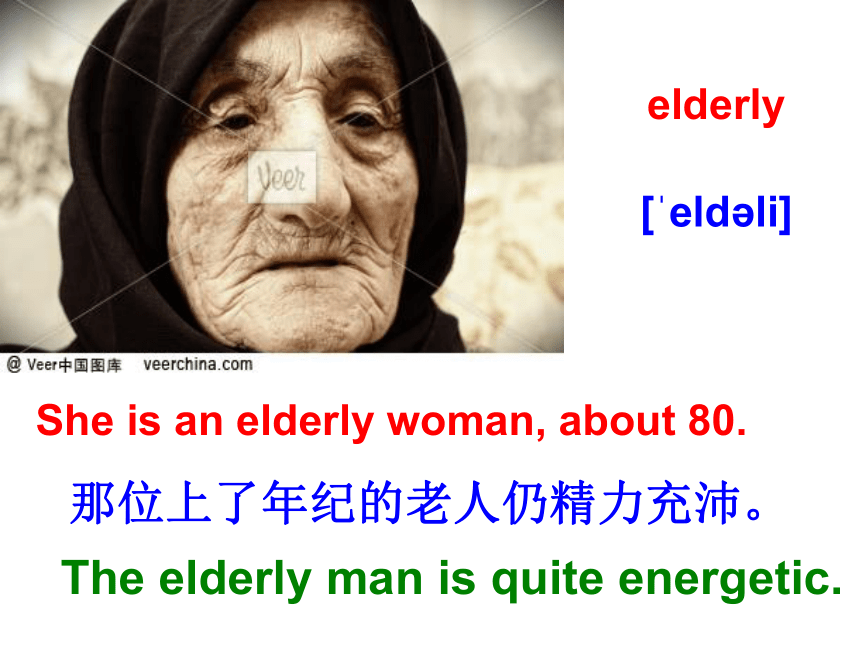
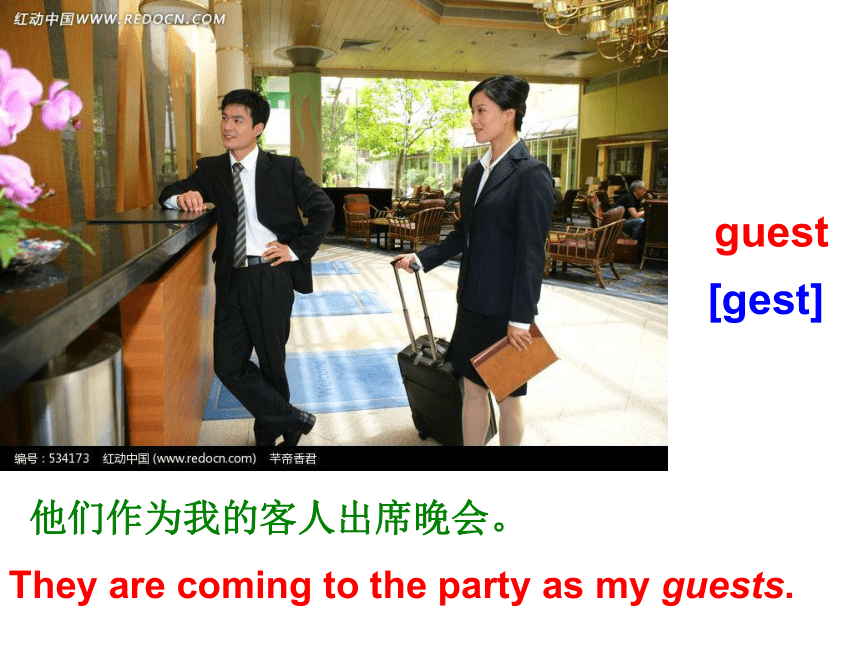
文档简介
课件42张PPT。Welcome chopsticks and a bowl a knife ,a fork and a plateChinaThe Western countriesChina : the dishes are placed on the table and everyone sharesThe West : they have their own plates of food China : Chinese hosts like to put food into the plates of their guestsThe West : the guests enjoy the food by themselveshostsguestsguestshostsLesson 45
Different Manners
manners[‘m?n?z]table manners
good manners
bad manners
different mannersHis good manners were praised by his teachers. 他的彬彬有礼受到了老师的称赞。modest[?m?d?st] 她是一名谦虚的运动员。She is a modest player.virtue[?v?:t?u:] Virtue is fairer far than beauty.美德远远胜于美貌.Honesty is a virtue. Modesty is a kind of virtue.Bravery is a great virtue.
Patience is a virtue.
Courage is a virtue. praise[pre?z] The guests praised the meal. 客人们称赞这顿饭做得好. v.&n.high praise
高度赞扬His drawings often win high praise from his teachers.[?pra?v?t] privateThe president is paying a private visit to Europe.
We each have our private views about it. 总统正在欧洲进行私人访问。我们每个人对这件事都有自己的看法。 elderly[?eld?li] She is an elderly woman, about 80.The elderly man is quite energetic.那位上了年纪的老人仍精力充沛。guest[gest] They are coming to the party as my guests.他们作为我的客人出席晚会。waiter[?we?t?(r)] waitressThe waiter came with a bottle of wine .tip[t?p] 我给了导游小费。I gave the guide a tip.manners n. 礼仪,习俗,礼貌
though conj. 虽然,尽管,即使,然而
modest adj. 谦虚的,谦恭的
virtue n. 美德 praise v.&n. 称赞,赞扬 private adj. 私人的,私有的
elderly adj. 上了年纪的,较老的 guest n. 客人 extra adj. 额外的,另外的 waiter n. (餐馆的)男服务员
tip v. 给小费New words45v.mp3tipwaiterguestelderlyprivatepraisevirtuemodestmannersListen to the first two paragraphs and answer the questions.45前两段.mp3
How long has Wu Zhou lived in Canada?
He has lived there for twenty-three years.
Why doesn't he feel Canadian?
Because north American manners and Chinese manners are so different.ListeningRead the lesson and match the behaviours with the correct countries.02.swfListen to the text and fill in the blanks01.swfRead the passage, find out the topic sentence and then finish the chart with the group members. Topic sentence: Understanding cultural differences really helps us to understand each other, live together and work together. Be modest “No ,no. My English is still poor.”Say “Thank you.”and be confident.Children’s or adults’Children’sIt’s polite.It’s polite but the elderly person may feel embarrassed.They may take turns paying for the meal.People often share the cost of a meal.It’s polite to put food on their plates.You pass food to guests, but you don’t usually put food on their plants.People seldom give money to waiters, waitresses, taxi drivers or hotel workers.People always give money to them, it is called “tipping”.Have a memory test about the text! In China, if someone _______ you, you should __ ________. be modestpraisesHe still doesn’t feel Canadian._______Wu Zhou has lived in Canada for 23 years.Though ________ Canadian culture ___ _______ _____ Chinese culture. is different fromAlthough He has many good friends in Canada.____ in North America you should just say “Thanks.”But In Canada people think age is ________ , so they only ask children about their age.In Canada, —————,they may feel embarrassed.In both China and Canada it is polite to______ a seat to the elderly person on the bus.But in China it is _______ to ask an adult’s age.privatehoweveroffercommonChinese people may _____ ______ _______ ___ the meal, when they are eating in the restaurant. but in Canada people only _____ food ___ the guest.In China, if there is no food on the guest’s plate, it’s polite to ____ food ___ their plate.However, Canadians often share the cost of the meal.In China, people _______ give extra money. but this is _______ done in North America. take turns paying for pass to put on seldom always1. call A B 把A称为B
When you call me European, I say yes.
当你叫我欧洲人的时候,我说是。
Why do I call it dreaming?
我为什么把它叫做梦想呢?2. ( be) embarrassed about 对…感到尴尬
This can make them nervous or embarrassed about speaking English in public.
这可能导致他们在公众场合说英语感到紧张或尴
尬。
3.Though I have lived here for a long time, I still don’t feel Canadian.
though /although引导让步状语从句, though /although和 but 不能连用,但是可以still和yet连用.
虽然他很累,但是他仍然继续工作。Though/Although he was tired, (yet) he went on working .
或 He was tired, but he went on working .
4. If someone praises you and says that your English is excellent.
praise sb. for sth.
因……而赞扬某人
因为他打扫教室,老师表扬了他。
The teacher praised him for cleaning the classroom.
因为她的诚实和勇敢,她的老师表扬了她。
Her teacher praised her for her honesty and bravery.
5. When Chinese people eat out in restaurants, they may take turns paying for the meal.
take turns doing sth 轮流做某事
这三个人轮流开车。
The three men take turns driving the car .
Fill the blanks with the words or phrases
in the box.
We should ____ little Debbie for her courage.
It’s long away. We can __________ driving.
They asked him to ________ the damage, but he refused.Pay for praise take turns modest privatepraisetake turnspay for4. Don’t talk about other people’s ________ things. It’s not polite.
5. Jack is a _______ man who is admired by many people.Fill the blankets with the words or phrases
in the boxPay for praise take turns modest privateprivatemodest单项选择。
( )1. 1 feel embarrassed about__________ by the children.
A. help B. be helped C. being helped D. is helping
( )2. How much did you_________ your car?
A.spend in B. cost C. pay D. pay for
( )3. Susan and her brother______________ doing the dishes.
A. take turns B. takes turn
C. to take turns D.taking turnsExercise( )4. It's not polite ___________ an adult's age in Canada.
A. ask B.to ask C. asking D. asked
( )5. We should give the boy another chance __________ he has made some mistakes.
A. though B. when C. unless D. because
Exercise选词填空,并注意形式。
guest, praise , manner, private, modest
He_______ Libai's poems pretty highly.
We each have our _________views about it.
Dinner was already ready by the time the ________arrived.
Mr. Zhang is a very_________ person.
You'd better know about western table________.
praised privateguestsmodestmanners三、根据汉语意思完成句子。
1.尽管她很聪明,但还是不能算出这道数学题。
__________________she is clever, she can't _____ ______ the math problem.
3.在中国谦虚是一种美德。
Being_____ is a ___________in China.
4.在中国把食物放在客人盘子里是很有礼貌的。
It's_______ ________ ________food_________ the guests’ plates in China.
5.你曾经给过服务员小费吗?
Did you use to give _________money to__________?
Though/Althoughwork out1. Chinese culture is different ___________ Canadian culture.
2. This kind of sound sounds __________ the singing of birds.
3. Thank you very much __________ what you did.
4. Do you know what is wrong __________ this machine?Ⅰ.根据句意用适当的介词填空。fromlikeforwithExercise1. 我们在中国居住了三年的时间了。
We _________ ________ in China for three years.
2. 问别人年龄是不礼貌的。
_________ _________ _________ to ask other’s age.
3. 你们可以称呼他王先生。
You can _________ _________ Mr. Wang.Ⅱ.根据所给的汉语完成下面的句子,每空一词。have livedIt’s not politecall him1. Remember the new words and phrases.
2. Read the text again and try to retell it in English.In your opinion, what are good manners?
Do you think cultures share manners?
Warming up1. private作形容词,意为“私有的;私人的”,在句中作定语或表语。e.g.Her brother works in a private company. privately是副词形式,意为“个人地;私自地”,在句中作状语。She was privately educated at schools in London and Paris. e.g.2. a sign of 一个标志
How you manage and cope with change is a sign of your professionalism and maturity.
如何处理和应付变化是你的职业特性和成熟的标志。2. This is probably because North American manners and Chinese manners are so different. 这很可能是因为北美洲的礼节与中国的理解太不一样的原因。e.g.These are what they bought for me. 句中的because North American ... 是表语从句,用在系词be后作表语,注意要使用陈述语序。3.In both China and North America, it is on the bus. 在中国和北美洲,在公共汽车上给年长者让座是有礼貌的。both … and … 意为“……和……都”,这是等立连词,可以连接句中句子成分相同的词语,如果连接主语时,谓语动词要用复数形式。Both Li Hong and Zhang Ping like this dress. e.g.
Different Manners
manners[‘m?n?z]table manners
good manners
bad manners
different mannersHis good manners were praised by his teachers. 他的彬彬有礼受到了老师的称赞。modest[?m?d?st] 她是一名谦虚的运动员。She is a modest player.virtue[?v?:t?u:] Virtue is fairer far than beauty.美德远远胜于美貌.Honesty is a virtue. Modesty is a kind of virtue.Bravery is a great virtue.
Patience is a virtue.
Courage is a virtue. praise[pre?z] The guests praised the meal. 客人们称赞这顿饭做得好. v.&n.high praise
高度赞扬His drawings often win high praise from his teachers.[?pra?v?t] privateThe president is paying a private visit to Europe.
We each have our private views about it. 总统正在欧洲进行私人访问。我们每个人对这件事都有自己的看法。 elderly[?eld?li] She is an elderly woman, about 80.The elderly man is quite energetic.那位上了年纪的老人仍精力充沛。guest[gest] They are coming to the party as my guests.他们作为我的客人出席晚会。waiter[?we?t?(r)] waitressThe waiter came with a bottle of wine .tip[t?p] 我给了导游小费。I gave the guide a tip.manners n. 礼仪,习俗,礼貌
though conj. 虽然,尽管,即使,然而
modest adj. 谦虚的,谦恭的
virtue n. 美德 praise v.&n. 称赞,赞扬 private adj. 私人的,私有的
elderly adj. 上了年纪的,较老的 guest n. 客人 extra adj. 额外的,另外的 waiter n. (餐馆的)男服务员
tip v. 给小费New words45v.mp3tipwaiterguestelderlyprivatepraisevirtuemodestmannersListen to the first two paragraphs and answer the questions.45前两段.mp3
How long has Wu Zhou lived in Canada?
He has lived there for twenty-three years.
Why doesn't he feel Canadian?
Because north American manners and Chinese manners are so different.ListeningRead the lesson and match the behaviours with the correct countries.02.swfListen to the text and fill in the blanks01.swfRead the passage, find out the topic sentence and then finish the chart with the group members. Topic sentence: Understanding cultural differences really helps us to understand each other, live together and work together. Be modest “No ,no. My English is still poor.”Say “Thank you.”and be confident.Children’s or adults’Children’sIt’s polite.It’s polite but the elderly person may feel embarrassed.They may take turns paying for the meal.People often share the cost of a meal.It’s polite to put food on their plates.You pass food to guests, but you don’t usually put food on their plants.People seldom give money to waiters, waitresses, taxi drivers or hotel workers.People always give money to them, it is called “tipping”.Have a memory test about the text! In China, if someone _______ you, you should __ ________. be modestpraisesHe still doesn’t feel Canadian._______Wu Zhou has lived in Canada for 23 years.Though ________ Canadian culture ___ _______ _____ Chinese culture. is different fromAlthough He has many good friends in Canada.____ in North America you should just say “Thanks.”But In Canada people think age is ________ , so they only ask children about their age.In Canada, —————,they may feel embarrassed.In both China and Canada it is polite to______ a seat to the elderly person on the bus.But in China it is _______ to ask an adult’s age.privatehoweveroffercommonChinese people may _____ ______ _______ ___ the meal, when they are eating in the restaurant. but in Canada people only _____ food ___ the guest.In China, if there is no food on the guest’s plate, it’s polite to ____ food ___ their plate.However, Canadians often share the cost of the meal.In China, people _______ give extra money. but this is _______ done in North America. take turns paying for pass to put on seldom always1. call A B 把A称为B
When you call me European, I say yes.
当你叫我欧洲人的时候,我说是。
Why do I call it dreaming?
我为什么把它叫做梦想呢?2. ( be) embarrassed about 对…感到尴尬
This can make them nervous or embarrassed about speaking English in public.
这可能导致他们在公众场合说英语感到紧张或尴
尬。
3.Though I have lived here for a long time, I still don’t feel Canadian.
though /although引导让步状语从句, though /although和 but 不能连用,但是可以still和yet连用.
虽然他很累,但是他仍然继续工作。Though/Although he was tired, (yet) he went on working .
或 He was tired, but he went on working .
4. If someone praises you and says that your English is excellent.
praise sb. for sth.
因……而赞扬某人
因为他打扫教室,老师表扬了他。
The teacher praised him for cleaning the classroom.
因为她的诚实和勇敢,她的老师表扬了她。
Her teacher praised her for her honesty and bravery.
5. When Chinese people eat out in restaurants, they may take turns paying for the meal.
take turns doing sth 轮流做某事
这三个人轮流开车。
The three men take turns driving the car .
Fill the blanks with the words or phrases
in the box.
We should ____ little Debbie for her courage.
It’s long away. We can __________ driving.
They asked him to ________ the damage, but he refused.Pay for praise take turns modest privatepraisetake turnspay for4. Don’t talk about other people’s ________ things. It’s not polite.
5. Jack is a _______ man who is admired by many people.Fill the blankets with the words or phrases
in the boxPay for praise take turns modest privateprivatemodest单项选择。
( )1. 1 feel embarrassed about__________ by the children.
A. help B. be helped C. being helped D. is helping
( )2. How much did you_________ your car?
A.spend in B. cost C. pay D. pay for
( )3. Susan and her brother______________ doing the dishes.
A. take turns B. takes turn
C. to take turns D.taking turnsExercise( )4. It's not polite ___________ an adult's age in Canada.
A. ask B.to ask C. asking D. asked
( )5. We should give the boy another chance __________ he has made some mistakes.
A. though B. when C. unless D. because
Exercise选词填空,并注意形式。
guest, praise , manner, private, modest
He_______ Libai's poems pretty highly.
We each have our _________views about it.
Dinner was already ready by the time the ________arrived.
Mr. Zhang is a very_________ person.
You'd better know about western table________.
praised privateguestsmodestmanners三、根据汉语意思完成句子。
1.尽管她很聪明,但还是不能算出这道数学题。
__________________she is clever, she can't _____ ______ the math problem.
3.在中国谦虚是一种美德。
Being_____ is a ___________in China.
4.在中国把食物放在客人盘子里是很有礼貌的。
It's_______ ________ ________food_________ the guests’ plates in China.
5.你曾经给过服务员小费吗?
Did you use to give _________money to__________?
Though/Althoughwork out1. Chinese culture is different ___________ Canadian culture.
2. This kind of sound sounds __________ the singing of birds.
3. Thank you very much __________ what you did.
4. Do you know what is wrong __________ this machine?Ⅰ.根据句意用适当的介词填空。fromlikeforwithExercise1. 我们在中国居住了三年的时间了。
We _________ ________ in China for three years.
2. 问别人年龄是不礼貌的。
_________ _________ _________ to ask other’s age.
3. 你们可以称呼他王先生。
You can _________ _________ Mr. Wang.Ⅱ.根据所给的汉语完成下面的句子,每空一词。have livedIt’s not politecall him1. Remember the new words and phrases.
2. Read the text again and try to retell it in English.In your opinion, what are good manners?
Do you think cultures share manners?
Warming up1. private作形容词,意为“私有的;私人的”,在句中作定语或表语。e.g.Her brother works in a private company. privately是副词形式,意为“个人地;私自地”,在句中作状语。She was privately educated at schools in London and Paris. e.g.2. a sign of 一个标志
How you manage and cope with change is a sign of your professionalism and maturity.
如何处理和应付变化是你的职业特性和成熟的标志。2. This is probably because North American manners and Chinese manners are so different. 这很可能是因为北美洲的礼节与中国的理解太不一样的原因。e.g.These are what they bought for me. 句中的because North American ... 是表语从句,用在系词be后作表语,注意要使用陈述语序。3.In both China and North America, it is on the bus. 在中国和北美洲,在公共汽车上给年长者让座是有礼貌的。both … and … 意为“……和……都”,这是等立连词,可以连接句中句子成分相同的词语,如果连接主语时,谓语动词要用复数形式。Both Li Hong and Zhang Ping like this dress. e.g.
同课章节目录
- Unit 7 Work for Peace
- Lesson 37 Don't Fight!
- Lesson 38 Making School a Better Place
- Lesson 39 The Dove and the Olive Branch
- Lesson 40 The UN—Power of Words
- Lesson 41 Jenny's Good Advice
- Lesson 42 Peace at Last
- Unit Review
- Unit 8 Culture Shapes Us
- Lesson 43 A Visit to Chinatown
- Lesson 44 Popular Sayings
- Lesson 45 Different Manners
- Lesson 46 Home to Many Cultures
- Lesson 47 Good Manners
- Lesson 48 Supper with the Bradshaws
- Unit Review
- Unit 9 Communication
- Lesson 49 Get Along with Others
- Lesson 50 Tips for Good Communication
- Lesson 51 What Could Be Wrong?
- Lesson 52 The Power of a Smile
- Lesson 53 Working in Groups
- Lesson 54 How Embarrassing!
- Unit Review
- Unit 10 Get Ready for the Future
- Lesson 55 Look into the Future
- Lesson 56 Manage Your Time
- Lesson 57 Best Wishes
- Lesson 58 Ms.Liu's Speech
- Lesson 59 Keep Your Choices Open
- Lesson 60 Get a Good Education
- Unit Review
